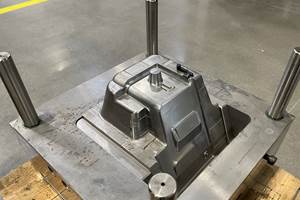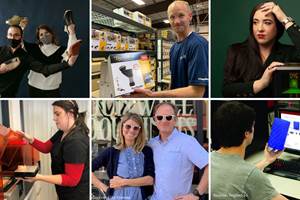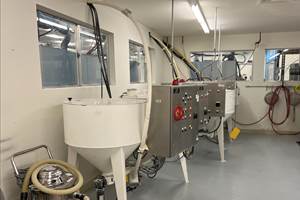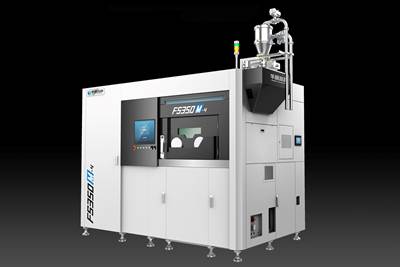Innovation is Revving Up: ‘Manufacturing Explorers’ Season 3
Buckle up and join Max and Travis as they talk about the thrills of visiting innovative automotive companies in the premiere of their third and final season of “Manufacturing Explorers,” an IMTS+ original series.
Share
Numbers matter in Season 3 of “Manufacturing Explorers,” an IMTS+ Original Series, which premieres Sept. 28 on IMTS.com. Here are three critical numbers encountered by show stars (and father-son duo) Travis and Max Egan as they explore the automotive industry:
- 2 — The number of parts in the rear underbody section of the Tesla Model Y, down from 70 on the Model 3.
- 185,000 — The number of electronic circuit boards printed each week at this Tier 1 supplier.
- 6,000°F — The temperature of a plasma column that synthesizes EV battery elements.
Season 3 starts with a visit to Munro & Associates in Auburn Hills, Michigan. Sandy Munro, known as the “Teardown Titan,” deconstructs and analyzes vehicles, and he has particularly focused on EVs. The tour starts with Munro explaining the genius behind the Model Y design, and really any design that consolidates parts for optimization. Munro calls items such as bolts “unfasteners.” Any design that eliminates a connection is one less thing to go wrong, and it’s something he happily points out as part of Munro’s redesign services.
Munro also answers Max’s questions about EV battery recycling and battery life (you’ll be surprised), explores the design of electric motors (they are only about the size of a basketball!), and provides insights into design and manufacturing efficiency. In a twist of fate, a fender bender at home provides the opportunity to rent a Model Y, and it’s a contest to see who becomes the bigger fan and why.
For Episode 2, Max and Travis travel to Magna Electronics to meet up with another father-son duo, General Manager John Cunningham and Manufacturing Engineer Alex Cunningham. If you drive a modern vehicle, chances are you’ve experienced one of the millions of sensors manufactured by Magna, including those used for cruise control, parking assist, object detection and tailgate cameras. Watch as Max experiences one of Magna’s newer innovations, the Toyota Tundra trailer backup assist, then gets a firsthand look at how printed circuit boards are made.
In the final episode of Season 3, Max and Travis explore what might be the key to EV growth: the synthesis of Li-ion anode and cathode battery materials. Based in North Andover, Massachusetts, 6K Inc. created the UniMelt system, a production-scale microwave plasma process that produces critical materials. Pour in feedstock at the top, zap it with an ultrahigh, temperate 6,000° plasma gas, and high-value materials come out at the bottom. Where conventional battery materials production processes made from lithium, nickel and cobalt pose geopolitical risks, and mining damages the environment while also being fraught with fair labor issues, UniMelt is a green process that enables a diverse and reliable supply chain for EV battery components, leveraging both domestic and recycled feedstock.
Season 3 is also bittersweet, as it’s the final season with Travis and Max. The show started with Max as a young mechanical engineering undergraduate and Travis introducing him to his world of manufacturing. After one pandemic, five years, two degrees and 10 road trips with dad and a camera crew, Max is now pursuing his dream career as a lead analyst in the renewable energy industry.
Join Max and Travis as they talk about the thrills of visiting innovative automotive companies in the premiere of their third and final season of “Manufacturing Explorers,” an IMTS+ original series, at IMTS.com/ManufacturingExplorers.
Related Content
Video: AM for Harder, Longer-Lasting Brake Discs
Additive manufacturing is being applied to limit automotive brake dust. For a major automaker, Etxetar and Talens are developing a production-speed directed energy deposition system to give brake discs a precise layer of wear-resistant carbide.
Read MoreDaimler, OMIC Evaluate Wire-Fed DED for Moldmaking
3D printing a core and cavity on machine from Gefertec, followed by machining, allowed for a complete mold tool to be produced in three days.
Read More8 Transformations 3D Printing Is Making Possible
Additive manufacturing changes every space it touches; progress can be tracked by looking for moments of transformation. Here are 8 places where 3D printing is enabling transformative change.
Read MoreA Tour of The Stratasys Direct Manufacturing Facility
The company's Belton manufacturing site in Texas is growing to support its various 3D printing applications for mass production in industries such as automotive and aerospace.
Read MoreRead Next
Alquist 3D Looks Toward a Carbon-Sequestering Future with 3D Printed Infrastructure
The Colorado startup aims to reduce the carbon footprint of new buildings, homes and city infrastructure with robotic 3D printing and a specialized geopolymer material.
Read MoreBike Manufacturer Uses Additive Manufacturing to Create Lighter, More Complex, Customized Parts
Titanium bike frame manufacturer Hanglun Technology mixes precision casting with 3D printing to create bikes that offer increased speed and reduced turbulence during long-distance rides, offering a smoother, faster and more efficient cycling experience.
Read MoreCrushable Lattices: The Lightweight Structures That Will Protect an Interplanetary Payload
NASA uses laser powder bed fusion plus chemical etching to create the lattice forms engineered to keep Mars rocks safe during a crash landing on Earth.
Read More




















